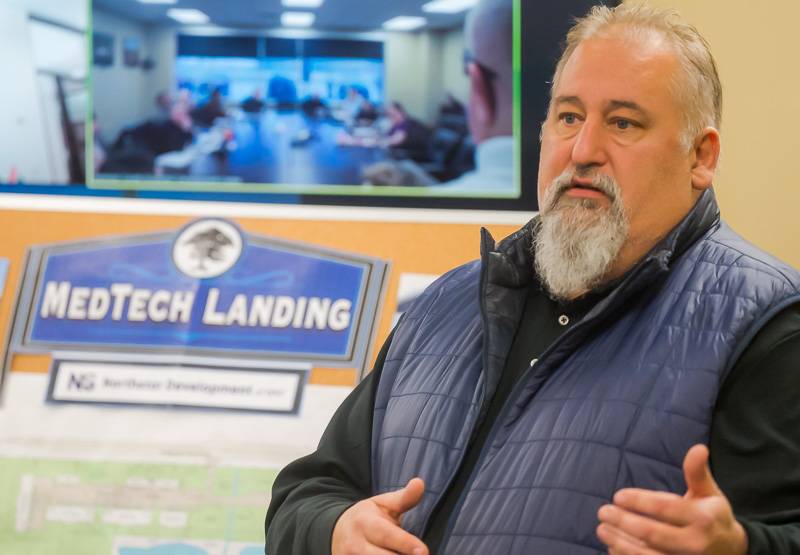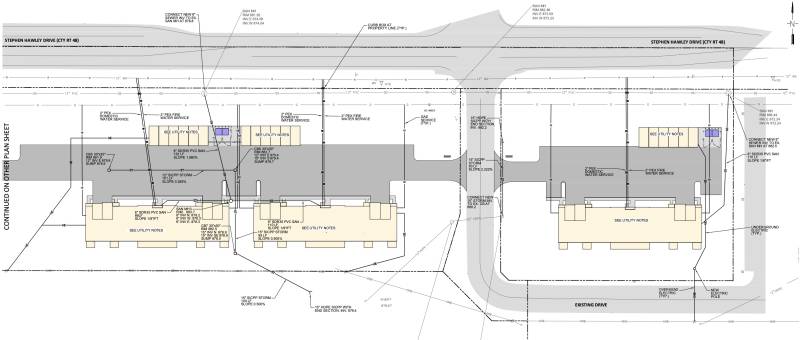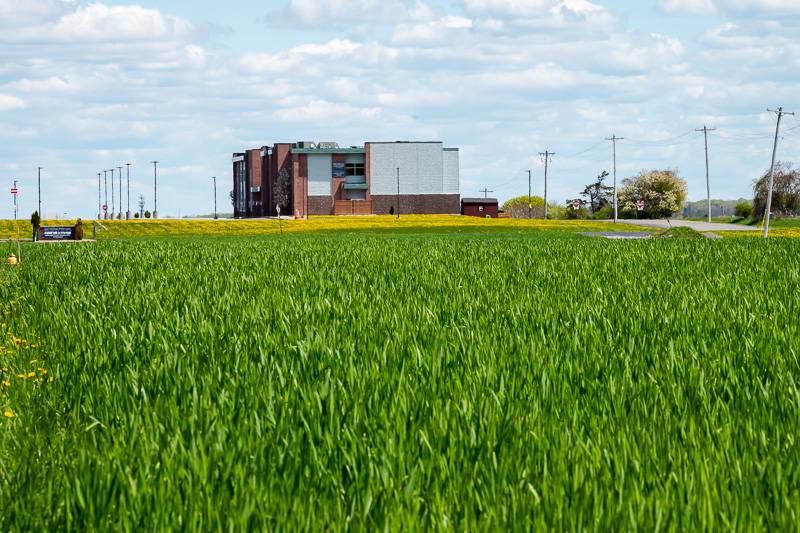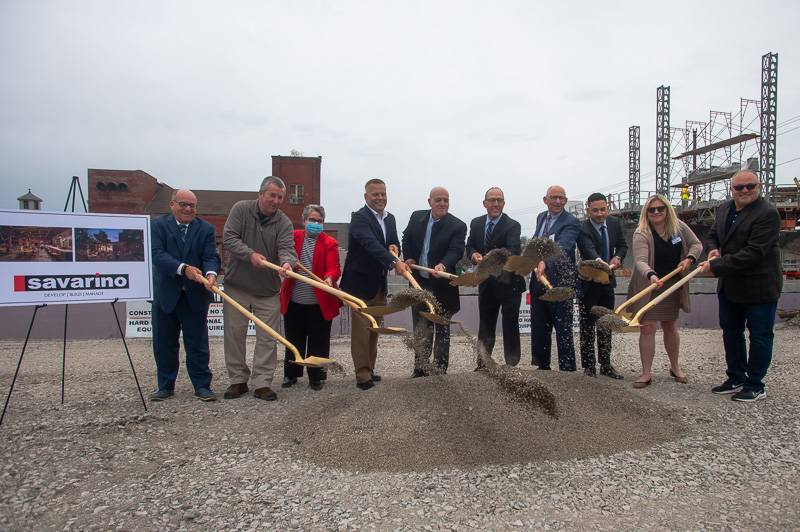Steve Hyde's retirement plans? Step out of the limelight, help with a new grandchild
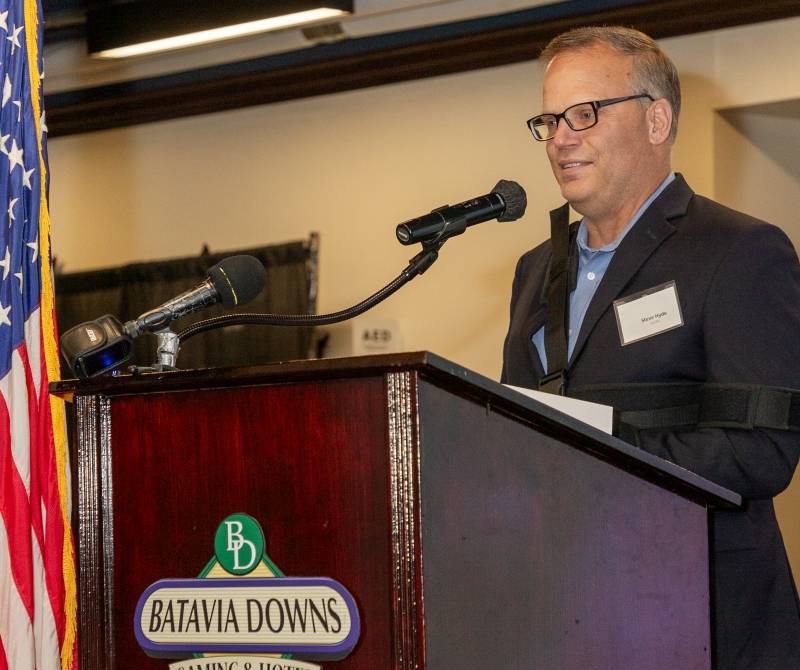
Photo by Steve Ognibene.
At only 61, Steve Hyde isn't planning a second career after his final days with the Genesee County Economic Development Center; he's planning to try out an actual retirement -- for awhile, at least.
"My kind of core values in retirement, I think are, I want to spend more time with my family, do a little traveling," Hyde said in an exclusive interview with The Batavian on Monday. "I'll try to be around to help out, but it's time to step away from the limelight and the leadership role a little bit."
Hyde has led the EDC for 21 years, overseeing the construction of eight shovel-ready industrial parks, including WNY STAMP, the Genesee Valley Agribusiness Park, Apple Tree Acres, Buffalo East Tech Park, and Gateway I & II corporate parks, among them. During that time, GCEDC has assisted with more than 500 projects, from building expansions to whole new factories, worth a combined $2 billion-plus of investments leading to the creation of thousands of new jobs and increased tax revenue for municipalities and school districts.
"I just think it's a good time for me (to retire)," Hyde said. "I mean, I hit critical milestones for our retirement plan. Things are in good shape at EDC. There's lots of progress and more to do. But, you know, my hope was to get things up and running and on plane, and with Edwards breaking ground and the Ag Park almost full, the great work going on with O-AT-KA and Upstate and HP Hood. The other parks are filling up. The next generation is ready to move, and it just seemed like a good time to do it."
Hyde graduated from Batavia High School. He earned a bachelor of science in marketing, finance, and agricultural economics from Cornell University and an MBA in finance in sales and marketing from RIT.
After earning his MBA, Hyde became manager of strategic finance/mergers and acquisitions for Xerox, followed by taking a shot in the start-up world with a software company before landing a VP of business and technology development at ResMed in Rochester.
Jim Vincent was chairman of the GCEDC board in 2002 when the agency began its search for a new president and CEO. There were several qualified candidates, Vincent said in a recorded message shared at the GCEDC annual meeting on Friday.
"Steve Hyde was our selection," Vincent said. "He is a gifted individual with experience from the big corporate world of Xerox. We were not sure if he was a good fit for a small town and small county economic development. We were won over by his commitment to home and family and his desire to raise his family here in Genesee County."
That was the start of a four-minute video in which community leaders praised Hyde's efforts to help Genesee County improve its business climate.
"There was no project or client that was too big or imposing," said Charlie Cook, chairman of the board for Liberty Pumps in Bergen. "He was determined that Genesee County be recognized statewide, even nationwide, as a great place to locate.
"Steve's approach to economic development was comprehensive and creative," Cook added. "Beyond the projects themselves, he was focused on the supporting peripherals, such as park development, infrastructure, workforce supply, workforce development, and even housing."
Hyde was quick to point out during his interview with The Batavian that "it takes a village" to succeed in economic development and that not only has he been blessed with a great team while leading the industrial development agency, the agency has also had great partners at the state and regional level.
"It wasn't just me," Hyde said. "I was just a part of the partnership that was really focused. I think about the number of organizations that really locked arms together to advance our shovel-ready sites, workforce development, and downtown revitalization strategies. I've been just really pleased to see that."
Hyde believes those efforts have been successful for Genesee County.
"The industrial parks have really helped really bring manufacturing back," Hyde said. "That's really been our focus for the past 20 years. I think we've had some good progress there, and they'll continue growing. I think we're seeing things grow, though not everything's perfect. Our downtown areas are seeing tons of redevelopment, making it a better place to live, work and play, but not everything's perfect in economic development, as you know."
In 2022, the most recent data available, Hyde was paid a salary of $249,752.
While leading the GCEDC, Hyde also served on the board of education for Batavia City Schools from 2007 to 2011. He is a past chairman of the New York State Economic Development Council and a member of the board of directors of the Finger Lakes Regional Economic Development Council. Those are all voluntary positions.
Hyde's 21 years at the helm of the agency haven't been without choppy waters and controversy.
In 2011, the agency was criticized for $344,000 in bonuses paid to GCEDC employees from 2005 to 2009. The bonus plan was eventually eliminated.
In 2013, The Batavian scrutinized tax abatements awarded to COR Development to help the owner of Batavia Towne Center on Veterans Memorial Drive attract Dick's Sporting Goods and Kohl's Department Store to the former Lowe's Home Improvement location, raising the level of corporate competition for local retailers.
In 2015, the sudden closure of the Muller Quaker yogurt plant in the Genesee Valley Agribusiness Park looked at first glance like a crushing blow to the cause of economic development. Pepsi Co. and the Muller Group from Germany invested more than $200 million in the plant only to shutter operations less than three years after its opening. The companies had been promised more than $11 million in tax abatements to build the plant, and people who misunderstood how tax abatements work thought the company was walking away with a windfall. However, both companies lost any pending tax breaks (a big portion of that $11 million), and Pepsi, a publicly traded company, reported a $60 million loss on the project. It's unknown how much Muller lost as a result of the business failure.
In 2015, Dairy Farmers of America acquired the plant for $60 million, and after paying a full-load property tax bill of more than $600,000 in 2016 on the property, sold the plant in 2017 to H.P. Hood for $54,216,000. Since then, the plant has undergone multiple expansions, employing hundreds of people beyond initial projections and turning it into one of GCEDC's biggest success stories.
Another yogurt plant, built by Alpina in the Ag Park, has undergone a similar transformation, from a failed business venture by the South America-based dairy company to a success for Upstate Niagara.
WNY STAMP has also seen its share of starts and stops. The most notorious was the highly-touted plans to build innovative solar panels on property in the tech park in the town of Alabama. After 1366, Technologies was unable to secure backing from the Department of Energy (largely, it seems, because then Sen. Chris Collins failed to endorse the project). The company decided to build its plant in Malaysia. It's unclear if that plant was ever built. It later merged with a solar company and became CubicPV, which, earlier this year, scrapped plans to build a new manufacturing plant in the United States.
No new development plans were announced for STAMP until 2021, when another green energy company, Plug Power, which converts water into hydrogen fuel, announced plans to build a $264 million plant there. At this point, a good deal of the plant's development has been completed, but the company doesn't expect the plant to start producing fuel until 2025. Plug Power is itself a controversial company, with the stock currently trading at $2.60. Investors have become increasingly weary of a company that has never made a profit in more than 20 years of its existence. Plug Power is awaiting word on a $1.5 billion low-interest loan from the Department of Energy that will help it complete its hydrogen fuel plants. Once fully operational, those plants are expected to lift company revenue sufficiently to close the profitability gap. Meanwhile, the company is facing a shareholder lawsuit.
WNY STAMP has also faced some opposition from environmental groups, and the Department of Environmental Conservation is being sued by the Tonawanda Senecas over its permitting of aspects of the project. The GCEDC has already defeated a lawsuit filed by Orleans County, but the DEC did recently require modifications to the sewer pipeline that was going to carry some waste from STAMP, so the agency has reached agreements with the town of Alabama and the town of Oakfield for an alternative sewer line.
Hyde's retirement announcement, however, coincided with good news for the IDA. Edwards Vacuum, planning a $319 million factory at STAMP, broke ground on Friday.
Hyde always takes all of these ups and downs in stride, saying, as he does often, that "economic development is a marathon, not a sprint." The business world is full of challenges, and few things go as expected.
When a business deal falls apart, Hyde understands. Those things are going to happen.
What has been harder to deal with -- and it's largely a more recent phenomenon -- is the amount of reporting from some media outlets, especially in Buffalo, that either employ reporters who don't understand business and economics, leave out critical information, or get information wrong.
"I think the biggest challenge for the job, especially so in the last few years, is the amount of misinformation that gets out into the public because facts are made up or manipulated rather than properly stated," Hyde said. "You know, I thank you because you've been one of the media outlets that has always worked hard to bring the facts to the table, but other outlets across the region have really created a smokescreen of misinformation. So misinformation, I think, is one of the biggest challenges."
Some of these outlets' inaccurate reporting has helped fuel social media attacks on Hyde. Asked if this has led him to seek an early exit, he said it hasn't.
"I'm a human being," Hyde said. "I have feelings, just like we all do. I've done nothing while in this role but to try and do everything I can to create more and better jobs for our residents and kids, you know, but being shot at by certain media outlets that don't have the facts portrayed correctly, it certainly is impactful and not helpful. I can't say that that drove me out of the job. No, but it can be heavy at times."
Hyde informed the GCEDC board months ago that he planned to retire in July. A committee has been busy seeking candidates, and Hyde suggested that his replacement could be announced soon. Hiring his replacement is entirely up to the GCEDC board, though the input of the Genesee County Legislature and Empire State Development is possible.
"It's truly a local decision," Hyde said. "The County Legislature, of course, gets to provide some input, but they don't get deeply involved, either. They've been wonderful that way, great partners, through the years, but they empower the board to let it be a local decision based on the people who know how these agencies are run."
In retirement, he looks forward to relaxing with his wife JoAnn at their home at Conesus Lake, which will become their full-time residence.
Hyde has expertise in negotiating business development deals that might continue to be in demand, and he's also gone down the entrepreneurial start-up route once. Might he be lured back into one of these roles again? Hyde has no such plans, he said. He said that going the start-up route once was enough, and while he's available to offer advice to his former colleagues, he thinks they're more than capable and will do fine just by keeping on doing what they're doing.
"At this juncture, I'm gonna take some time off and spend it with the family and friends, and probably for several months, if not longer, just to try to, you know, figure out what retirement looks like. Maybe something down the road, but I made a commitment to my wife JoAnn that we would do that. We've got to. We've got a second grandson coming in a couple of weeks, so I want to help out there. It'll be fun."

